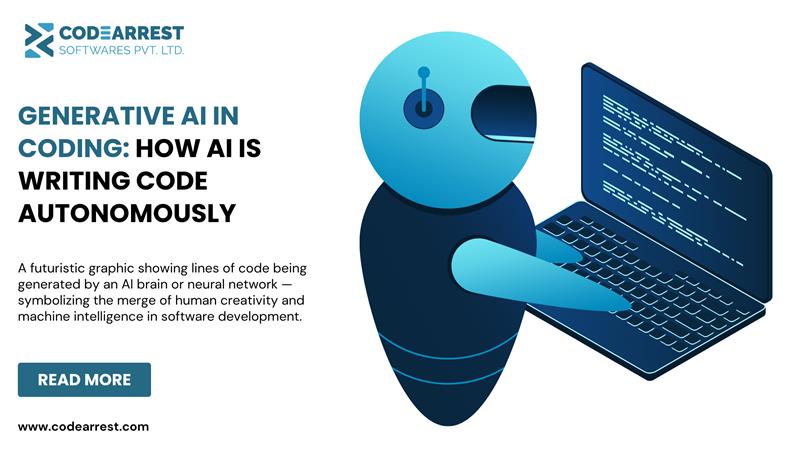
Generative AI in Coding: How AI is Writing Code Autonomously
1. Introduction: The Rise of AI-Powered Coding
The way software is developed is undergoing a massive transformation. With Generative AI, coding is no longer just a manual process—it’s becoming smarter, faster, and more autonomous. AI models can now generate code snippets, detect bugs, suggest optimizations, and even write entire programs from scratch.
At CodeArrest, we believe this shift marks the beginning of a new era where humans and machines collaborate seamlessly to build high-quality software at lightning speed.
2. What is Generative AI in Coding?
Generative AI refers to artificial intelligence systems that can create new content—be it text, images, or, in this case, code. In software development, these AI models are trained on massive codebases from languages like Python, JavaScript, and C++ to learn coding patterns, logic structures, and best practices.
They don’t just copy-paste code—they understand context and generate new, functional solutions. Tools like GitHub Copilot, Tabnine, and Amazon CodeWhisperer are prime examples of how AI is revolutionizing everyday coding tasks.
3. How AI is Writing Code Autonomously
AI systems now go beyond offering simple code suggestions—they’re writing code autonomously. Here’s how:
- 🧩 Natural Language to Code Conversion: Developers can simply describe a feature in plain English, and AI translates it into functioning code.
- ⚡ Automated Debugging: AI models can detect errors in real-time, predict potential issues, and offer optimized solutions instantly.
- 🔄 Code Refactoring: AI cleans, organizes, and simplifies code structures to enhance performance and readability.
- 🤖 End-to-End Project Generation: Some advanced AI systems can generate an entire backend or frontend structure by understanding project requirements and datasets.
This means businesses can move from idea to execution faster than ever before.
4. Benefits of Generative AI in Software Development
Generative AI is not here to replace developers—it’s here to empower them. Let’s explore some key benefits:
- 1️⃣ Faster Development Cycles: AI automates repetitive coding tasks, reducing time-to-market significantly.
- 2️⃣ Improved Code Quality: With built-in optimization and real-time error detection, the final output is cleaner and more reliable.
- 3️⃣ Cost Efficiency: Automating code generation and debugging minimizes manual effort and resource usage.
- 4️⃣ Continuous Learning: AI models keep evolving through exposure to new data, ensuring they stay updated with modern frameworks and practices.
- 5️⃣ Enhanced Collaboration: AI tools can act as virtual team members—reviewing pull requests, offering suggestions, and maintaining coding standards across teams.
5. Challenges of Autonomous AI Coding
While the benefits are impressive, there are also challenges to address:
- Data Privacy Risks: AI systems trained on public repositories might unintentionally replicate licensed or sensitive code.
- Context Understanding: AI may misinterpret vague or incomplete instructions, leading to unexpected results.
- Ethical and Security Concerns: Relying too much on autonomous systems can introduce new vulnerabilities if not monitored carefully.
This is why AI coding requires human oversight—the combination of human logic and AI speed creates the most balanced approach.
6. The Role of CodeArrest in AI-Driven Software Development
At CodeArrest, we’re integrating AI-powered development tools to enhance productivity, reduce human errors, and build scalable software solutions.
Our approach involves:
- Using AI-assisted coding frameworks for faster and smarter code generation.
- Incorporating machine learning models for predictive maintenance and system optimization.
- Ensuring data privacy and compliance through ethical AI governance practices.
By blending human expertise with AI intelligence, CodeArrest delivers innovative, high-performance applications that meet the evolving needs of modern businesses.
7. The Future of Generative AI in Coding
The future of coding is AI-first. Soon, developers will act as creative architects—defining what needs to be built—while AI handles the execution.
We’re moving toward a reality where AI can not only write but also test, deploy, and monitor applications autonomously.
As these technologies mature, businesses that embrace AI-driven development early will gain a competitive edge in speed, quality, and innovation.
Conclusion
Generative AI is rewriting the rules of software development. From accelerating delivery times to improving code accuracy, it’s reshaping how digital products are built.
At CodeArrest, we’re proud to be at the forefront of this evolution—using AI to create smarter, faster, and more efficient software solutions that drive business growth.
The future isn’t about choosing between humans and AI—it’s about harnessing both to innovate beyond limits.
Contact us: +1 302-400-2818, +91 70738 99493
Info: sales@codearrest.com
